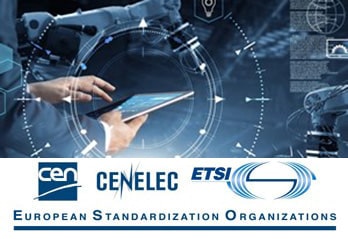DIN, DKE & VDI developing the German Standardization Roadmap for Circular Economy
Together with the German Federal Ministry for the Environment, Nature Conservation and Nuclear Safety (BMU), the German Institute for Standardization (DIN) and the German Commission for Electrical, Electronic & Information Technologies (DKE) of DIN and VDE and the Association of German Engineers (VDI) have announced the launch of the German Standardization Roadmap Circular Economy. The aim of the Standardization Roadmap is to provide an overview of the status quo of standardization in the field of Circular Economy, describe the requirements and challenges for seven key topics, and identify possible concrete needs for action for future standards and specifications.
Essential support for climate targets: The Circular Economy is of particular importance in achieving the goals of the Green Deal and the Climate Change Act 2021. To achieve the ambitious climate protection targets, new and revised technical rules for the Circular Economy are now needed. The Standardization Roadmap Circular Economy will set the path for this, thus driving forward the green transformation of Germany and Europe.
A New Standard Contributes to Improving the Energy Efficiency of Jet Fans
When talking about energy efficiency, one of the most overlooked appliances is fans. Fans of all types are used for ventilation and air conditioning, for process engineering, and agriculture. Their energy use has been calculated as nearly 20% of total worldwide energy usage. To ensure that the fan performance characteristics are common throughout the world, a series of standards has just been developed by ISO and adopted by CEN.
Among these, the recently published EN ISO 12759-5 'Fans-Efficiency classification for fans - Part 5: Jet fans' establishes a classification of fan efficiency for all jet fan types driven by motors with an electrical input power range from 5,5 kW to 155 kW. Jet fans are used for producing a jet of air in a space, unconnected to any ducting. They find applications in the control of quality of air in vehicle and train tunnels, as well as in enclosed car parks, and their use has become increasingly popular (from EN ISO 13350:2015 'Fans - Performance testing of jet fans').
This document was prepared by Technical Committee ISO/TC 117 'Fans', in collaboration with the CEN/TC 156 'Ventilation for buildings', whose Secretariat is held by BSI, the British Standards Institute.
Industrial data has become one of the top strategic priorities for European and international industry in the recent years. Well managed and duly exploited, industrial data bring a significant competitive edge to businesses and can greatly improve overall efficiency, be it by supporting core processes or by providing a new source of insights.
In this data-driven era, industrial data play an essential role in building the foundation of the next wave of digitization in Europe. For this reason, it is key to the success of a harmonised Single Market and European competitiveness in the global market, but also for the success of the twin transition (green and digital) at the heart of the EU policy agenda.
Industrial data is of ever-increasing importance for companies in Europe and the world, and particularly so in the context of the digitization of industry. On this topic, on 28 Sept, CEN, CENELEC and ETSI co-organised an online stakeholders’ workshop dedicated to exploring how standards can support the industrial data value chain.








